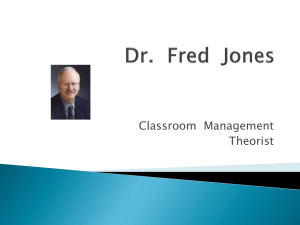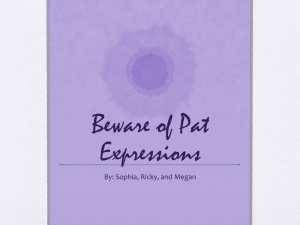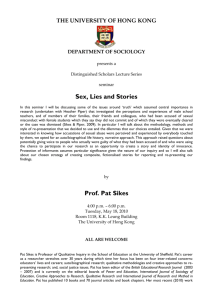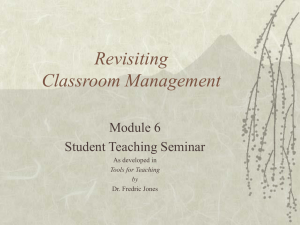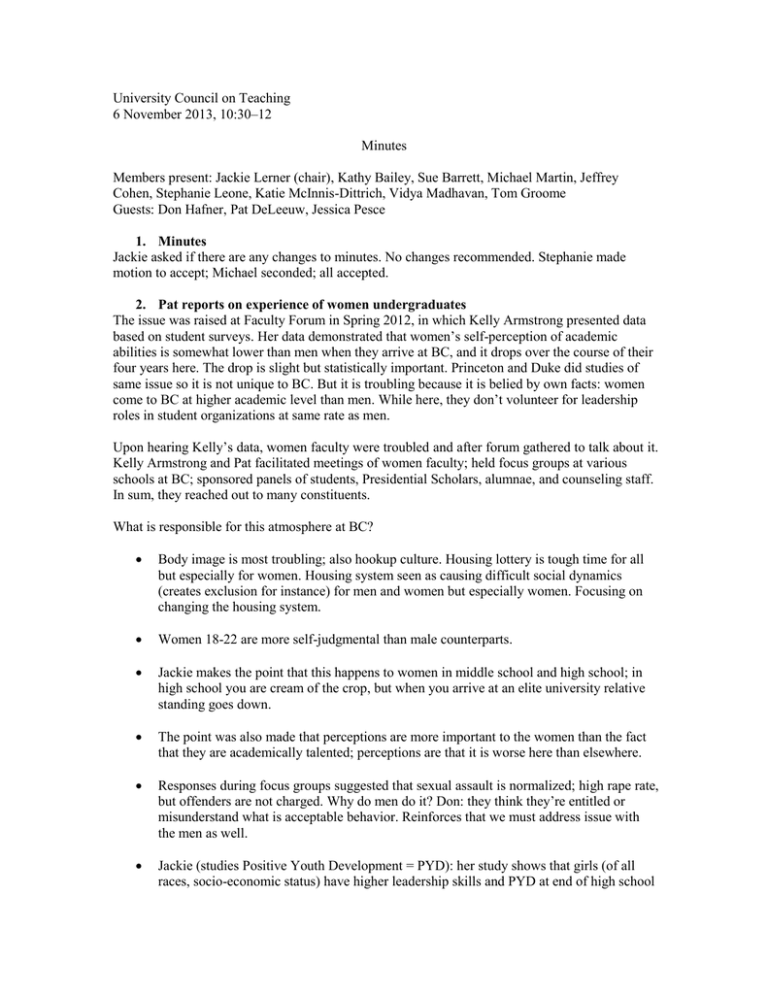
University Council on Teaching
6 November 2013, 10:30–12
Minutes
Members present: Jackie Lerner (chair), Kathy Bailey, Sue Barrett, Michael Martin, Jeffrey
Cohen, Stephanie Leone, Katie McInnis-Dittrich, Vidya Madhavan, Tom Groome
Guests: Don Hafner, Pat DeLeeuw, Jessica Pesce
1. Minutes
Jackie asked if there are any changes to minutes. No changes recommended. Stephanie made
motion to accept; Michael seconded; all accepted.
2. Pat reports on experience of women undergraduates
The issue was raised at Faculty Forum in Spring 2012, in which Kelly Armstrong presented data
based on student surveys. Her data demonstrated that women’s self-perception of academic
abilities is somewhat lower than men when they arrive at BC, and it drops over the course of their
four years here. The drop is slight but statistically important. Princeton and Duke did studies of
same issue so it is not unique to BC. But it is troubling because it is belied by own facts: women
come to BC at higher academic level than men. While here, they don’t volunteer for leadership
roles in student organizations at same rate as men.
Upon hearing Kelly’s data, women faculty were troubled and after forum gathered to talk about it.
Kelly Armstrong and Pat facilitated meetings of women faculty; held focus groups at various
schools at BC; sponsored panels of students, Presidential Scholars, alumnae, and counseling staff.
In sum, they reached out to many constituents.
What is responsible for this atmosphere at BC?
Body image is most troubling; also hookup culture. Housing lottery is tough time for all
but especially for women. Housing system seen as causing difficult social dynamics
(creates exclusion for instance) for men and women but especially women. Focusing on
changing the housing system.
Women 18-22 are more self-judgmental than male counterparts.
Jackie makes the point that this happens to women in middle school and high school; in
high school you are cream of the crop, but when you arrive at an elite university relative
standing goes down.
The point was also made that perceptions are more important to the women than the fact
that they are academically talented; perceptions are that it is worse here than elsewhere.
Responses during focus groups suggested that sexual assault is normalized; high rape rate,
but offenders are not charged. Why do men do it? Don: they think they’re entitled or
misunderstand what is acceptable behavior. Reinforces that we must address issue with
the men as well.
Jackie (studies Positive Youth Development = PYD): her study shows that girls (of all
races, socio-economic status) have higher leadership skills and PYD at end of high school
but then it goes down in college especially at elite colleges; this is a critical time for girls
to figure out who they are.
Tom: Does it have to do with negative images of women in Catholic tradition? Yes, this
has been discussed as a possible factor.
Don: Princeton study is startling because it shows that over the course of about three
decades, women’s participation in campus leadership declined. Is this a downward spiral
of campus culture?
Pat: This is politically fraught, more so than the study on drinking; faculty group discussed
relationship to Catholic Tradition. There will be a carefully controlled Heights article
Plan: Kelly and Pat are meeting with Jack Dunn and Pat Keating and are going to recommend
task force to monitor it and to recommend plan of action.
Tom points out that the men’s culture must change too; who is going to pick up the ball and
initiate change?
Pat is hoping that task force will initiate this change. Council for Women at BC (alumnae) is
prepared to give gift for Women and Leadership series. Jackie says that message must begin with
freshman as they enter BC. Europeans have culture change interventions that really work; for
instance they acknowledge that high school students will drink, so they create culture where it
won’t be cool to drink to excess. Work on students to accept what drinking is, what it means. Not
a zero-tolerance approach.
BC Students for Sexual Health (Jackie) – administrators are meeting with students around
positive sexual health programming. Jackie says it has to be a multi-pronged approach because
this is about the whole person: eating, sexual health, alcohol, self-image, etc. A school wide
culture change is really hard. But this is what we need.
Other remarks:
Jeff: uses cold calling in classes because business school culture is that men dominate
Faculty has power to do things in classroom.
Kathy: we need more information on the cause.
Pat: current programs in Student Affairs are good so some positive things are going on.
Problem has been known but tracking of data is new.
Jeff: asks if sexual orientation was brought up at focus groups. Jessica said that only one selfidentified as lesbian and another spoke of lesbian roommate who simple doesn’t go out.
Don: thinks that recommendations in study are sensible. Don is worried if we do something that
we think will help but doesn’t.
All: We need to constantly track this data.
Don: have other institutions figured out best practices? Pat doesn’t think so.
Pat: we have a problem discussing what we’re not good at because we are new to the “top
universities” tier.
Don: we should find out if data has been kept that would help us understand if this is a change
over time at BC.
Pat encourages us to read report and would welcome continued discussion.
3. Brainstorming ways to understand where we are with offering 1- and 2-credit
courses
Michael: English is offering 2 1-credit courses. The students who need only 1 or 2 credits are a
very small number because internships may be used for 1 credit.
Don: at beginning of discussion to change from course load to credits, it was asked, how many
students is this going to affect? They anticipated that transition would go smoothly.
Vidya: how does a 2-credit course count for faculty member’s course load? Do you then have to
teach 2 courses rather than 1?
Kathy: Seniors are now taking 5 courses each semester and this is causing stress for those writing
a thesis. Kathy, asks is this working?
Michael: we’ve essentially added 2 courses. It hasn’t affected Sciences. It has affected
Humanities and Social Sciences. A large number of students were over the needed number.
Don: UN courses that are 1 or 2 credits. Not tied to department.
Question posed: Which EPC approves these courses? Brings up question whether nondepartment-based courses should be allowed. They’re operating for now.
Michael: In A&S, EPC does not have a course approval method; departments approve courses.
This is different in other schools.
We made a decision to invite faculty who have been dealing with 1-2 credit offerings to the next
meeting of UCT. For example, Chairs of Earth and Environmental Sciences, English, and
someone involved in Cross-current Seminars.
Vidya: why did we introduce these courses? It doesn’t seem that we need it.
Don: offers flexibility to departments, ways to innovate or meet different needs (field experience).
Questions that need to be answered: How is it impacting faculty-teaching loads? Reception by
students?
If we invite Katie Dalton and Peter Folan for this issue, we should also discuss women’s issues.
For our next meeting, we’ll continue both of today’s discussions.
Meeting adjourned about noon. Next meeting is on Wednesday, December 11, at 10:30-12:00.
Respectfully submitted,
Stephanie C. Leone


